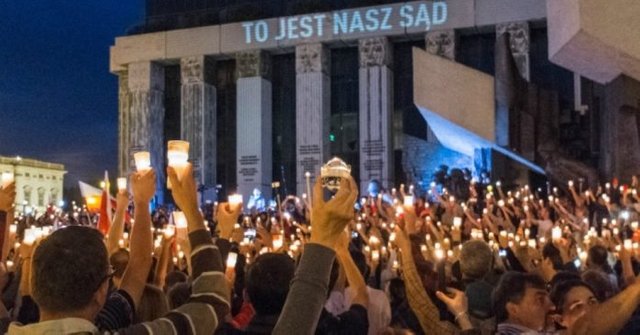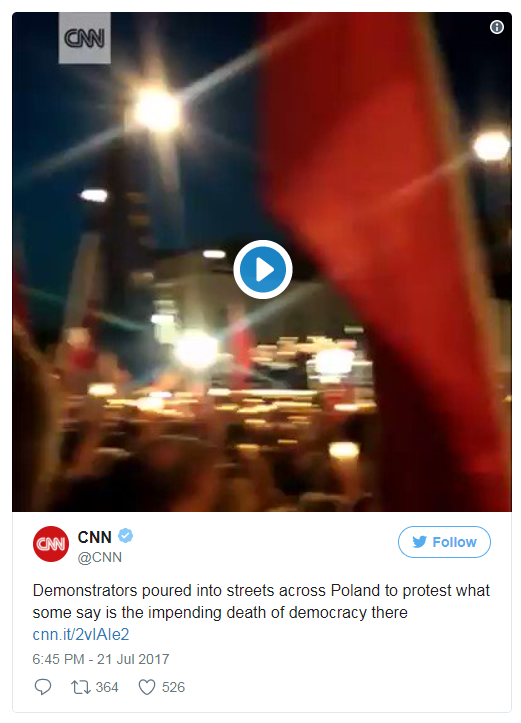
Tens of thousands poured into the streets in Poland Thursday night, condemning proposed laws that would dramatically weaken the nation’s judicial system, just two weeks after U.S. President Donald Trump visited the country and praised its commitment to freedom and democracy, speaking to “an audience of close to 15,000 enthusiastic, flag-waving Poles—many of them bused in by Poland’s ruling right-wing” party.
The pending judicial reform is just the latest in a series of anti-democratic measures adopted in Poland since the far-right Law and Justice Party (PiS) came to power in 2015. As the New York Times noted, the party has “increased government control over the news media, cracked down on public gatherings, and restricted the activities of nongovernmental organizations.” It has also limited female reproductive rights.
Now, the party is “moving aggressively to take control of the last major independent government institution, the courts,” the Times noted, by pushing through two measures that would effectively give the party total control over judge selection.
Characterizing the party as “right-wing, EU-skeptic, and nationalist,” Politico explained the party’s two proposed measures:
Last week, parliament adopted a new law revamping the body that appoints judges, the National Council of the Judiciary (KRS), ending the terms of its 15 judges and allowing parliament, where PiS has a narrow majority, to nominate their successors.
The ruling party then moved on to legislation that would immediately retire all the judges on the Supreme Court except those designated by Justice Minister Zbigniew Ziobro, and would lower the requirements for future judges chosen for the court—a step critics say would allow the ruling party to pack the court with its allies. The Supreme Court is Poland’s top court for civil, criminal and military cases; it also confirms election results.
The KRS revamp has been approved by parliament and is awaiting Polish President Andrzej Duda’s signature. Duda formerly belonged to PiS, but as president is considered an independent whose responsibility it is to stand up to PiS party leader Jarosław Kaczyński, who is often considered the country’s de facto leader. However, Duda is often aligned with PiS, and opposition parties lack the power to truly challenge the proposals.
In an unexpected break with his former party, Duda said he would only sign the KRS reform if lawmakers amended the bill so that judges are approved by 60 percent of parliament, rather than a simple majority, as is proposed in the bill’s approved version. PiS is one seat short of a 60 percent majority. Duda also said if parliament doesn’t pass the amendment, he will veto the second bill that would force out the current Supreme Court judges.
Acknowledging Duda’s demands as a “rare disagreement” with Kaczyński and PiS, the Times reported, some are skeptical of the Polish president’s intentions:
Opponents were not sure whether this signaled a true split between the two leaders or was some sort of a trick.
“We don’t know if the president is acting really with some sort of noble intentions or whether he’s just playing a game,” said Mr. Stepien, the former president of the Constitutional Tribunal.
The second bill was approved by the lower chamber of Parliament Thursday—triggering the pro-democracy protests—but still must be approved by the upper house, then signed by Duda, to take effect.


In addition to several thousand protesters across Poland, human rights groups and leaders in Europe condemned the recent moves by PiS to consolidate control as anti-democratic.
“This is a blatant attack by Poland’s government on the independence of the judiciary and the rule of law,” Lydia Gall of Human Rights Watch said in a statement, adding that the “deeply flawed” bill targeting Supreme Court judges “runs counter to European Union and Council of Europe standards.”
Donald Tusk, president of the European Council and former prime minister of Poland, strongly condemned the proposals, and said in a statement: “Bringing the courts under control of the governing party in the matter proposed by the Law and Justice Party (PiS) will ruin the already tarnished public opinion about Polish democracy.”
European efforts to pressure Poland with sanctions, though being considered, would likely be impeded by its ally and fellow EU-member, Hungary, as the Washington Post reported:
The suspension, a never-invoked nuclear option, would come under Article 7, the section of E.U. treaties that is designed to make sure that all members “respect the common values of the E.U.”
The rule of law is one of the values on which our union is founded and which defines our union,” European Commission Vice President Frans Timmermans told reporters in Brussels. “Given the latest developments, we are coming very close to triggering Article 7.”
But any move to strip Polish leaders of their voice in E.U. decisions would require the unanimous consent of the other 27 leaders, and Hungarian Prime Minister Viktor Orban has already said he does not support the idea. Orban has come under similar criticism for his efforts to centralize power in Hungary.
Although the State Department released a statement on Friday that criticized the pending laws, a Polish journalist wrote for the Daily Beast that Trump’s visit two weeks ago served as “a ringing endorsement” of Poland’s government that encouraged “the government’s most authoritarian tendencies.”
In Trump’s troubling and strange speech in Poland two weeks ago, the U.S. president said he was honored “to address the Polish nation that so many generations have dreamed of: a Poland that is safe, strong, and free.”
A political science professor at NYU compared Thursday’s pro-democracy demonstrations to Trump’s speech, which was attended by PiS supporters:

This article has been shared from our website:http://anonymous-news.com/protests-in-poland-as-right-wing-ruling-party-dismantles-democracy/
Please @anonnews , don't use / quote CNN if you want people to take you seriously!?
Downvoting a post can decrease pending rewards and make it less visible. Common reasons:
Submit
Great news and article, thank you
Downvoting a post can decrease pending rewards and make it less visible. Common reasons:
Submit
Nice post. Thanks for share information
Downvoting a post can decrease pending rewards and make it less visible. Common reasons:
Submit
Given the state of many democratic EU countries, especially the super liberal-pro-everything EU countries, I'm willing to give this Duda fellow a shot. If it's anything they can call "anti-liberal" or "anti-democracy" (the same "democracy" we gave the Middle East?), it's going to get all kinds of negative press.
People love the Ancient Greek philosophers... they should see what those guys had to say about democracy.
Downvoting a post can decrease pending rewards and make it less visible. Common reasons:
Submit
Democracy is about majority, but giving minorities also some kinds of rights and freedom.
Downvoting a post can decrease pending rewards and make it less visible. Common reasons:
Submit
Well, that's the thing. Democracy can be about whatever the majority says it's about. Given the outreach of today's media and the repetition of whatever tptb wants us to hear, the majority can be convinced of just about anything. That's a part of the problem, and why groups like this one in Poland are on the rise across Europe and elsewhere.
It doesn't have to be Trump-esque, but it does have to try and solve some of today's systemic problems. Who knows, maybe they can do something about their currency to avoid the fate of some other European states. If they try, the powers that be will ensure the world knows (via sensationalism and repetition) that they are the new Nazi party, regardless of what they do (kind of like the various Trump accusations that have mostly disappeared).
Downvoting a post can decrease pending rewards and make it less visible. Common reasons:
Submit